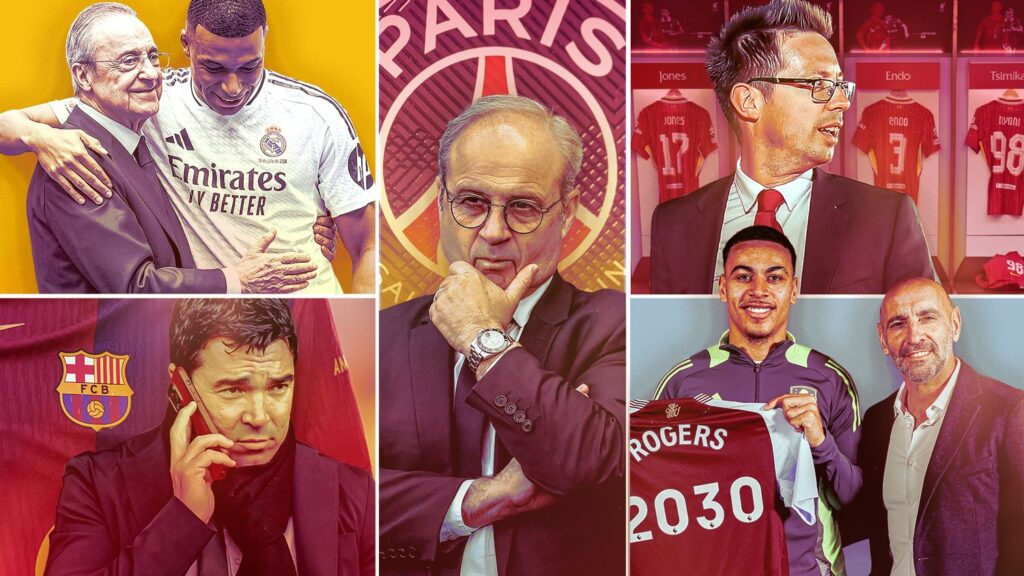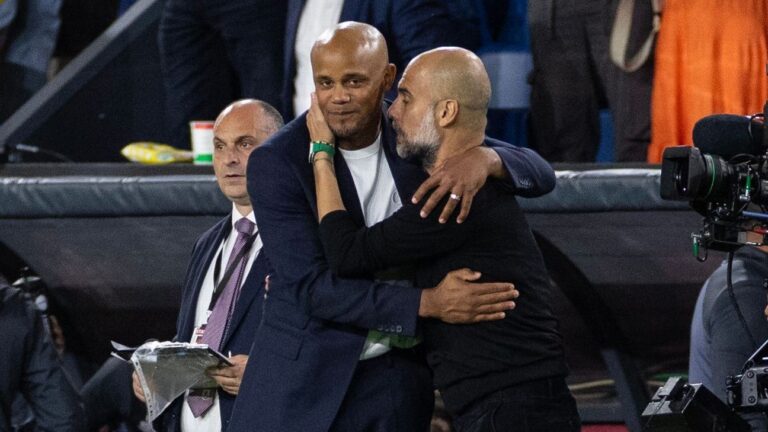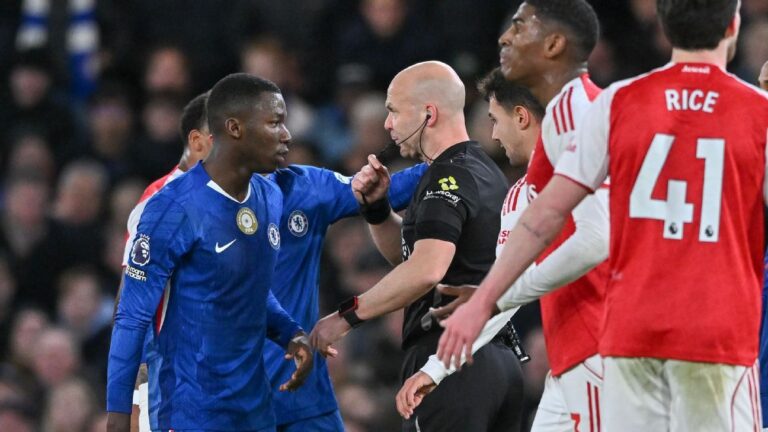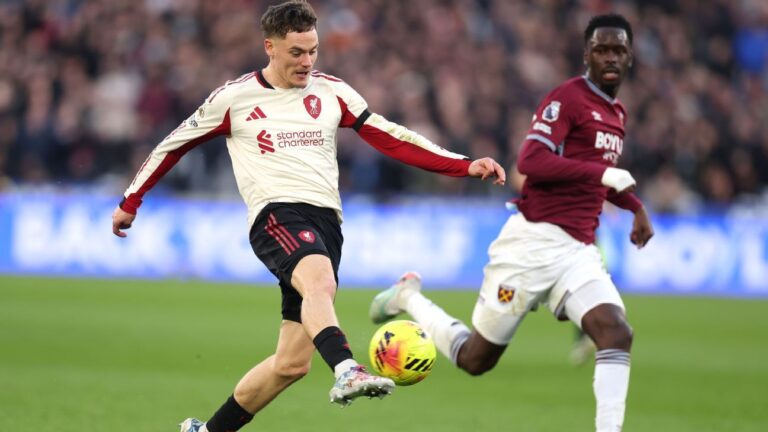The January transfer window is just around the corner, but how much do we know about the people behind the scenes who are responsible for making things happen? Be it a sporting director, managing director or even club president, Europe’s top clubs all have someone pulling the strings … well almost all, as Arsenal are currently without one after sporting director Edu Gaspar’s November exit to head up the multi-club model of Nottingham Forest and Olympiacos owner Evangelos Marinakis, and Manchester United just parted company with Dan Ashworth after five months.
Long gone are the days of managers like Manchester United’s Sir Alex Ferguson or Arsenal’s Arsene Wenger calling the shots when it comes to transfers. Now it’s down to transfer gurus to run the show.
Here are some folks who could make waves for their clubs in January.
Chelsea’s decision to hire two sporting directors and get them working together attracted some bemusement among colleagues in Europe. The club has been nebulous in explaining exactly what Winstanley (who joined from Brighton & Hove Albion in November 2022) and Stewart (from AS Monaco in February 2023) are actually doing — and who’s doing what — but the pair are clearly occupied with scouting, recruitment and overseeing the club’s strategy in the transfer market as a whole.
Unlike Winstanley, who was Brighton’s talent identification manager and then head of recruitment, Stewart has some prior experience as technical director at Monaco, and he was global head of scouting at Red Bull Soccer International. But the final negotiations on any transfer are likely to be conducted by a representative of the ownership group fronted by Todd Boehly and Behdad Eghbali.
With over €1.3 billion spent since the group took control 2½ years ago, Stamford Bridge has enjoyed an influx of elite-level young talent on an unprecedented scale. But regardless of the club’s untraditional structure and initial teething problems, Chelsea’s recent upturn in form and the development of recent signings like Cole Palmer and Moisés Caicedo suggests something is clearly working now.
Key skills: Stewart and Winstanley are kept extremely knowledgeable on worldwide talent from a wide network. Being employed by affluent, transfer-happy owners who see the value in spending big on youth ensures they have plenty of room to manoeuvre.
Priority tasks for January: Moving on from French centre-backs Axel Disasi and Benoît Badiashile, who rarely feature, and finding new clubs (possibly on loan) for midfielders Cesare Casadei and Carney Chukwuemeka. Ukraine winger Mykhailo Mudryk, who cost an initial €70m, also needs to leave in order to play regular first-team football. The development of striker Nicolas Jackson has halted the club’s endless search for a No. 9 … for now, anyway.
Top signing: Palmer’s £40m move from Manchester City in 2023 has worked out incredibly well.
Though Begiristain, who was director of football at Barcelona from 2003 to 2012, has mainly stayed in the background during his 12-year tenure at Manchester City, he can claim a significant stake in the club’s incredible success over the past decade. Indeed, manager Pep Guardiola’s former teammate played a vital role in bringing the legendary head coach to Manchester in 2016, and together with Ferran Soriano (CEO), who typically performs the transfer negotiations, the three Spaniards have constituted a formidable leadership trio.
The work of aligning the footballing operations across all 13 clubs in the City Football Group portfolio (which includes, among others, New York City FC, Melbourne City FC, Yokohama F. Marinos and Girona), should be widely attributed to Begiristain. He might have wanted a quieter end to his final year at the club — Sporting CP’s Hugo Viana has already been announced as his successor in the summer — but City’s recent struggles could see the 60-year-old more active than usual in January.
Having been instrumental in attracting a wide range of stars to Barcelona and City during his career — such as Kevin De Bruyne, Rodri, Rúben Dias, Dani Alves and Gerard Pique — Begiristain is not short of contacts and is well acquainted with the most powerful agents and club presidents in the world.
Key skills: Discreet in his dealings and highly respected worldwide, Begiristain arguably has the most experience of his peers. With over €1bn spent on transfers under Guardiola, the pulling power of one of the most free-spending and successful clubs in history helps, too.
Priority tasks for January: Though a proper squad revamp is more likely in the summer, a specialist No. 6 midfielder to cover for the injured Rodri and a centre-forward to take some weight off Erling Haaland’s shoulders are the most immediate causes of concern. Adding some depth at full-back or centre-back would be good, too.
Top signing: City spent €76m to land midfielder De Bruyne from VfL Wolfsburg in 2015 and, after his struggles at Chelsea, Begiristain took a gamble.
Edwards made an impactful return to Liverpool in March this year following almost a two-year absence. The 45-year-old — who climbed the ladder at Anfield from chief analyst to sporting director during his first stint with the club from 2016 to 2022 — rejoined in the role of sporting CEO (not dissimilar from a German structure, in which the head of the footballing department reports directly to the board), practically running the entire footballing activities.
Although Edwards is assisted by Richard Hughes — appointed as a sporting director in the summer — it doesn’t mirror the Chelsea structure, and Edwards is still the one making the final call on transfers. The driving force behind Arne Slot landing the head coach position once Jurgen Klopp had announced his departure, Edwards is in a strong position and enjoys the total trust of the club’s owners, Fenway Sports Group. While undoubtedly among the most potent football executives in the Premier League, Edwards shuns publicity and leaves the limelight to others.
Key skills: Hugely respected, both internally and externally, he is a pioneer in the meticulous use of analytics and appreciates that recruitment is based on coherent teamwork.
Priority tasks for January: New contracts for Mohamed Salah, Virgil van Dijk and Trent Alexander-Arnold top the list. With the form of veteran left-back Andrew Robertson a worry, a new addition to provide competition in that spot could be valuable. And even with Ryan Gravenberch playing his best football, another No. 6 or all-round central midfielder might be useful if Liverpool are to hold onto their lead and win the title this season.
Top signing: Though he had failed at Chelsea, Salah’s €42m move from AS Roma in 2017 is arguably one of the best signings in history.
Filling the vacancy left by Fabio Paratici — who resigned after his 30-month suspension was upheld by Italy’s highest sports court for his part in a false accounting scandal when he was at Juventus — Lange has mainly stayed in the background since joining Spurs from Aston Villa a year ago.
Though he spends most of his time out of the public domain, Lange is a respected figure in the industry. Unlike Paratici, he’s more process-driven — ensuring smooth alignment throughout the footballing structure — rather than shadowing head coach Ange Postecoglu and the first team or obsessing about transfers all year long. Still, Lange has an ostensibly weaker mandate than Paratici, and Spurs being Spurs, it’s likely that Daniel Levy — the club’s chairman, and a “transfer guru” in his own right — is heavily involved in transfer dealings, especially at the negotiation table.
Lange pulled off a coup in diverting young midfielder Lucas Bergvall from Barcelona, while last summer’s youthful squad revamp illustrated how he is keen to work with a long-term vision. Though that vision has yet to bed in, of course, it will be intriguing to see whether Spurs and Lange are prepared to temporarily divert from the strategy by filling the gaps in the squad (and mitigating the current injury crisis) in January with more experienced names.
Key skills: Analytical and thorough, Lange is a strategic thinker who is keen to preserve the long-term goals of the club, irrespective of results.
Priority tasks for January: Identifying a backup goalkeeper for long-term absentee Guglielmo Vicario. Adding new blood to a defence and central midfield that are short in numbers is another consideration. And, if results, in general, don’t improve rapidly, the search for a new head coach to replace Postecoglu might also turn up as an unwanted distraction.
Top signing: Bergvall is too young to use here, but during his time at Villa, Lange picked up striker Ollie Watkins from Brentford for £28m in 2020.
One of the most heralded “transfer gurus” of the past few decades, Ramón Rodríguez Verdejo — better known by his nickname, “Monchi” — can take the credit for building Sevilla into a multiple Europa League-winning side and firmly establishing the club as a genuine player in Spanish football during a 17-year spell starting in 2000. But his smooth operations in the transfer market have also inspired many budding scouts and sporting directors worldwide.
Monchi made a name for himself by unearthing relatively unknown players who went on to become stars, including the likes of Jesús Navas, Sergio Ramos and José Antonio Reyes, while pulling off bargain signings like Dani Alves, Júlio Baptista and Ivan Rakitic. And though his magic touch has slightly diminished with the arrival of data analytics — his two-year stint at Roma after he left Sevilla left a lot to be desired — few colleagues can rival his network of scouts and relevant top-end contacts.
Now reunited with former Sevilla boss Unai Emery, the 56-year-old Monchi has made a positive impact at Aston Villa — overseeing the arrival of the likes of Amadou Onana, Youri Tielemans and Pau Torres since he joined in July 2023. But he has adopted a more conservative approach later in his career. Partly because the world of scouting is a lot more competitive these days — with most elite clubs having access to the same data and tools — and partly because patience for young talent to grow is in much shorter supply than during his heyday at Sevilla.
Key skills: With over 20 years in the business, few can match his level of experience. He has a great eye for talent and likes to cement strong relationships with head coaches and owners.
Priority task for January: With important squad members such as Tyrone Mings and Boubacar Kamara set to return from long-term injuries, Villa might only make cosmetic changes. And that could be a great opportunity for Monchi to dip into his old bag of tricks to find the next big superstar.
Top signing: There have been a lot, but signing defender Jules Koundé for Sevilla from Bordeaux for €35m in 2019 was great business.
Newcastle acted swiftly to appoint the highly rated Mitchell following Ashworth’s drawn-out departure to Manchester United this summer. The Englishman built a solid reputation as a scout at Tottenham and Southampton before taking on more senior roles within the Red Bull system and Monaco. At the latter, he contributed heavily to reestablishing the club at the top of French football and a return to the Champions League.
Mitchell has also shown himself capable of choosing head coaches — Monaco’s Adi Hütter proved highly successful — and those skills might soon be in demand at Newcastle should Eddie Howe fail to get the club back to winning ways. Held back by the constraints of profit and sustainability rules (PSR), Mitchell has not quite managed to make his mark in the northeast yet, and his most urgent focus is likely to be trimming a squad that is higher in numbers than in overall quality.
Key skills: He has expert knowledge of the transfer market from more than a decade as a scout, while his experience from working at Red Bull also speaks to him having a clear footballing philosophy.
Priority tasks for January: Raising funds and reinvesting wisely. Midtable is unlikely to satisfy the club’s ambitious owners.
Top signing: While he was a scout, he spotted Bayer Leverkusen forward Son Heung-Min and persuaded Tottenham to sign him.
No other football executive even comes close to the Real Madrid president on leaving a lasting transfer legacy. Since he was first elected president in 2000 (with a three-year hiatus from 2006 to 2009), Perez has engineered the arrival of countless world stars. David Beckham, Luis Figo, Zinedine Zidane, Luka Modric and Kylian Mbappé — not to mention the two Ronaldos — are just the icing on a very glamorous cake.
Though the Galactico strategy of the early 2000s didn’t bear as much fruit as expected, Perez has helped Madrid to seven LaLiga and Champions League titles to assert them as one of the most successful teams of all time. And he is building his own world beaters in the form of Federico Valverde, Vinícius Júnior and Jude Bellingham. Though Perez is supported by an impressive court of advisers — José Angel Sanchez (CEO), Santiago Solari (director of professional football) and Emilio Butragueno (director of institutional relations) at the forefront — no new signing passes through the doors at the Bernabeu without Perez’s go-ahead.
Key skills: A billionaire in his own right, Perez heads the most prestigious football adventure of modern times. As he approaches 80, he remains the undisputed No. 1 club president in the world.
Priority tasks for January: With three key defenders — Éder Militão, Dani Carvajal, David Alaba — out for the long term, one or two fresh additions in defence should be under consideration. Organising a loan move for 18-year-old superstar striker Endrick, who is struggling for minutes, is another relevant matter at hand.
Top signing: Picking only one is an impossible task, but it’s hard to look beyond the €94m move for Manchester United’s Cristiano Ronaldo in 2009.
Having spent just a year-and-a-half in the job, Anderson Luis da Souza — otherwise known as “Deco” — is a relative newcomer to the scene. The former Chelsea and Barcelona midfielder works in the shadows of prominent Barca president Joan Laporta — who enjoys getting involved in transfer business himself — although the club’s €1.2bn of debt and constant financial challenges restrict his room to manoeuvre.
Barcelona have little cash to compete for the world’s leading talent, yet the incredible La Masia academy more than compensates, with the likes of Gavi, Lamine Yamal and Pau Cubarsí coming through. The 2024 summer transfer window also proved tricky, with just two new arrivals in Dani Olmo (€60m) and Pau Víctor (€2.7m), whom they managed to register for LaLiga only due to an injury loophole.




